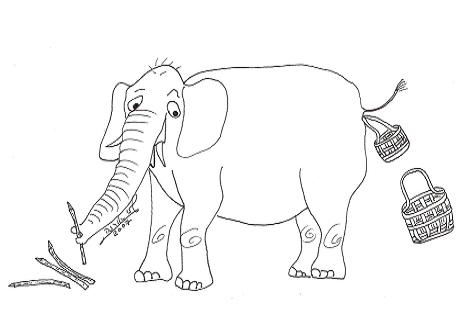
One of the sages, Rami the son of Chama, asked: If an elephant swallowed a basket made of palm fronds and excreted it with his excrement, does the basket convey ritual impurity? The scholars discussed this sage’s question and argued that if the elephant swallowed a palm frond basket which already was able to convey impurity and then excreted it with his excrement, it is clear that the basket retains this property, and there is no doubt whatsoever about it. A basket was swallowed and a basket was excreted. If so, the scholar argued, the doubt would exist in the case of an elephant which ate palm fronds which have not been made into a basket, and in the elephant’s guts the fronds weaved themselves together into a basket shape. The elephant swallowed loose palm fronds and excreted a palm frond basket. Can this basket convey impurity or not? What are the issues under debate? On one hand, the act of digestion and excretion with the excrement may be seen as the formation of excrement. On the other hand, it was a palm frond basket which emerged, and this bears no resemblance to excrement, whose form is quite different. The scholars attempt to resolve this doubt from an incident which occurred. Wolves devoured two infants on the other side of the Jordan, ate them, and some time later excreted material which included the flesh of the infants. They asked whether the wolf excrement (the digested infant flesh) did or did not convey ritual impurity. The sages determined that it was pure! From this incident the scholars concluded that digestion negates the fronds and reduces them to excrement; the palm frond basket should be pure. Following further thought, the scholars rejected this proof and argued that one could not form an analogy from the digestion of meat to the digestion of palm fronds. Infant flesh is, by its nature, tender, and so its digestion and change of form is total. Palm fronds are not completely digested and do not completely change their form. The scholars attempted to bring proof from the bones of the infants which the wolves excreted with their excrement; the sages ruled these bones impure. This proof, too, was rejected, the argument being that one could not draw an analogy between bones and palm fronds. Bones are hard and do not change their form at all during digestion. Bones go in and bones come out. In contrast, palm fronds do change their form slightly during digestion. (This doubt was not resolved in the Talmud.)
(Babylonian Talmud, Tractate Menachot 49a-b)
